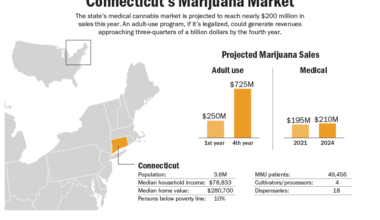California’s largest legal cannabis cultivator appears to have renewed dozens of state permits despite falling out of compliance with a labor-friendly licensing requirement, records show.
Glass House Brands, which operates massive cultivation operations in Santa Barbara and Ventura counties in Southern California, renewed 25 cultivation permits between December 2024 and March 2025, according to state Department of Cannabis Control records.
It did so despite what appears to be a labor peace agreement (LPA) that expired in October 2024, according to a document obtained via a public records request.
Glass House did not respond to requests for comment from MJBizDaily.
In a statement, a spokesman for the DCC said licensees are required to submit accurate information to the state.
Though Glass House claimed to have a valid LPA, there’s no mechanism in state law for regulators to verify whether that information was correct.
The episode appears to be the latest example of a cannabis company evading labor-friendly licensing requirements, observers told MJBizDaily.
And it raises questions about regulator oversight and whether the labor peace agreement requirement is working as intended.
“I’d say this LPA requirement is both flawed in theory and in practice,” said Alexis Lazzeri, an attorney with Los Angeles-based firm Manzuri Law.
Records show expired pact with union absent from cannabis sector
California’s largest legal cannabis cultivator, publicly traded Glass House is one of the cannabis industry’s best known companies.
Under California law, as a company with 10 or more employees, Glass House is required to have a valid LPA with a “bona fide labor organization” in order to renew its annual permits.
Meant to increase union activity in the labor-intensive legal cannabis industry, labor peace agreements are pacts between a company and a union in which the employer pledges not to interfere with organizing activity.
In return, the union agrees not to engage in strikes or organize boycotts – two of the most powerful tools available.
Similar labor-friendly requirements apply in other states such as New York and Oregon, though several companies have filed lawsuits arguing such laws violate their constitutional rights.
And in Oregon, a federal judge has ruled against LPAs, though that decision is on appeal.
October 2023 labor agreement lasted for one year
In Glass House’s case, the cultivator signed a labor peace agreement in October 2023 with the Seafarers Entertainment and Allied Trades Union (SEATU), according to records provided to MJBizDaily.
The SEATU is a union mostly active in the maritime sector with no known organizing efforts in cannabis retail or cultivation.
Critics claim cannabis companies are keen to sign LPAs with unions that have no intent to organize their workers. Some companies have gone as far as to sign LPAs with “unions” that appear to be shells or shams with no organizing activity at all.
But what’s more, according to documents the DCC provided to MJBizDaily via a public records request, Glass House’s labor peace agreement with SEATU expired in October 2024.
Signed on Oct. 16, 2023, the LPA between Glass House and the Seafarers expired after a year, although it could be extended “by mutual written agreement.”
Marijuana cultivator renewed 25 permits despite LPA questions
No document indicating its renewal was submitted to the DCC, the agency said.
The company nonetheless subsequently renewed 10 cultivation permits in Santa Barbara County in March 2025 and 15 permits for its cultivation operation in Camarillo, California, in Ventura County in December 2024, according to DCC records.
Along with other paperwork for its renewals, Glass House submitted an attestation page claiming that its labor peace agreement with SEATU was still valid, according to DCC spokesman David Hafner.
SEATU did not respond to requests for comment.
However, in an interview earlier this summer with cannabis industry newsletter WeedWeek, a spokesman for the union seemed to confirm that the agreement was no longer in effect.
‘We have nothing to do with those companies’
“We’re completely out of the mix with the cannabis industry and have been for a while. So, we have nothing to do with those companies,” WeedWeek reported union spokesman Jordan Biscardo saying.
“Those agreements all were terminated … last year, I think,” Biscardo said, according to WeedWeek.
Biscardo did not immediately respond to a request for comment from MJBizDaily.
And the DCC could not say whether Glass House met its requirements to renew its license.
“Each licensee is responsible for providing accurate information when renewing licenses,” said Hafner, the agency’s spokesperson.
“When Glass House renewed its annual licenses, it submitted an attestation page stating it had an LPA with the Seafarers.”
Near-automatic process with no regulator oversight
The situation raises questions about the DCC’s ability or interest to verify its licensees comply with the law, observers told MJBizDaily.
California cannabis license holders can renew their annual permits via an online process that’s nearly automatic, Lazzeri, the attorney with Manzuri Law, said.
The online form requires a licensee to check a box in which they claim that their labor-peace agreements are still valid, said Lazzeri, who reviewed the situation on MJBizDaily’s request.
At that point, “the onus is essentially on the DCC to review the submitted documentation and reach out to the licensee if there are deficiencies,” she said.
“It’s clear to me that this renewal initially occurred without any resistance because the process of license issuance is automated, and the DCC failed to actually review and follow up on the submitted documentation.”
Subscribe to the MJBiz Factbook
Exclusive industry data and analysis to help you make informed business decisions and avoid costly missteps. All the facts, none of the hype.
What you will get:
- Monthly and quarterly updates, with new data & insights
- Financial forecasts + capital investment trends
- State-by-state guide to regulations, taxes & market opportunities
- Annual survey of cannabis businesses
- Consumer insights
- And more!
Uncertain era for cannabis labor under Trump 2.0
Glass House made national news in July when Immigration and Customs Enforcement (ICE) agents raided the company’s grows in Camarillo and Carpinteria, California.
Federal authorities arrested more than 300 employees suspected of working at the company without valid immigration documents. Glass House was also accused of unlawfully employing children, though no charges have been publicly announced.
In the wake of the raids, Glass House announced it had signed a new LPA with the International Brotherhood of Teamsters.
Meanwhile, federal lawsuits challenging LPA requirements are pending in Oregon and in New York.
The Oregon lawsuit is on appeal despite state regulators saying in May they’ll ditch the requirement.
Other labor unions active in the cannabis sector, including the United Food and Commercial Workers and the Teamsters, did not respond to requests for comment for this story.
Unions made some progress in organizing cannabis businesses under the labor-friendly Biden administration.
Yet unions still often had to resort to the courts or to the National Labor Relations Board (NLRB) after encountering what they claimed was unlawful obstruction from cannabis companies.
Most observers expect a pro-business Trump administration to be a setback for labor.
However, Teamsters President Sean O’Brien, who spoke at the Republican National Convention, has taken pains to forge a relationship with the White House.
Chris Roberts can be reached at chris.roberts@mjbizdaily.com.
Medical Disclaimer:
The information provided in these blog posts is intended for general informational and educational purposes only. It is not a substitute for professional medical advice, diagnosis, or treatment. Always seek the advice of your physician or other qualified healthcare provider with any questions you may have regarding a medical condition. The use of any information provided in these blog posts is solely at your own risk. The authors and the website do not recommend or endorse any specific products, treatments, or procedures mentioned. Reliance on any information in these blog posts is solely at your own discretion.






